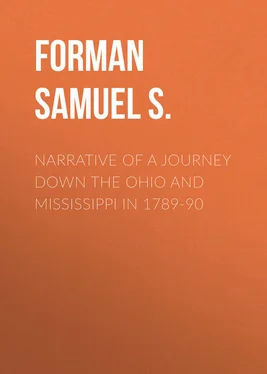Samuel Forman - Narrative of a Journey Down the Ohio and Mississippi in 1789-90
Здесь есть возможность читать онлайн «Samuel Forman - Narrative of a Journey Down the Ohio and Mississippi in 1789-90» — ознакомительный отрывок электронной книги совершенно бесплатно, а после прочтения отрывка купить полную версию. В некоторых случаях можно слушать аудио, скачать через торрент в формате fb2 и присутствует краткое содержание. Жанр: foreign_antique, foreign_prose, на английском языке. Описание произведения, (предисловие) а так же отзывы посетителей доступны на портале библиотеки ЛибКат.
- Название:Narrative of a Journey Down the Ohio and Mississippi in 1789-90
- Автор:
- Жанр:
- Год:неизвестен
- ISBN:нет данных
- Рейтинг книги:5 / 5. Голосов: 1
-
Избранное:Добавить в избранное
- Отзывы:
-
Ваша оценка:
- 100
- 1
- 2
- 3
- 4
- 5
Narrative of a Journey Down the Ohio and Mississippi in 1789-90: краткое содержание, описание и аннотация
Предлагаем к чтению аннотацию, описание, краткое содержание или предисловие (зависит от того, что написал сам автор книги «Narrative of a Journey Down the Ohio and Mississippi in 1789-90»). Если вы не нашли необходимую информацию о книге — напишите в комментариях, мы постараемся отыскать её.
Narrative of a Journey Down the Ohio and Mississippi in 1789-90 — читать онлайн ознакомительный отрывок
Ниже представлен текст книги, разбитый по страницам. Система сохранения места последней прочитанной страницы, позволяет с удобством читать онлайн бесплатно книгу «Narrative of a Journey Down the Ohio and Mississippi in 1789-90», без необходимости каждый раз заново искать на чём Вы остановились. Поставьте закладку, и сможете в любой момент перейти на страницу, на которой закончили чтение.
Интервал:
Закладка:
Samuel S. Forman
Narrative of a Journey Down the Ohio and Mississippi in 1789-90
PREFATORY NOTE
I ACKNOWLEDGE my indebtedness to a friend of the Forman family for calling my attention to the interesting narrative of Major Samuel S. Forman’s early journey down the Ohio and Mississippi, and for aiding me in securing a copy for publication. The manuscript of this monograph, as now presented, has been submitted to friends and kindred of Major Forman, who knew him long and well, and they have accorded it their warm approval.
With their kind approbation, I feel encouraged to offer this little contribution to western historical literature to an enlightened public.
L. C. D.Madison, Wis.
MEMOIR OF MAJOR SAMUEL S. FORMAN
EVERY addition to our stock of information touching early western history and adventure, and of the pioneer customs and habits of a hundred years ago, deserves a kindly reception. The following narrative of a journey down the Ohio and Mississippi, in 1789-90, was not reduced to writing till 1849, after a lapse of sixty years; but an unusually fine memory enabled Major Forman to relate such incidents of his trip as left a lasting impression upon him, alike with interest and general accuracy. A sketch of the writer will give us a better insight into his trustworthiness and character.
Major Forman, the third son of Samuel and Helena Denise Forman, was born at Middletown Point, Monmouth county, New Jersey, July 21, 1765. He was too young to participate in the Revolutionary war, during the stirring period of 1776 to 1780, in New Jersey; but his elder brothers, Jonathan and Denise, were prominent and active throughout the great struggle. Major Forman has recorded some incidents of the war that occurred in his region of New Jersey, and within his own knowledge, worthy of preservation as interesting scraps of Revolutionary history. At one time, a cousin of his, Tunis Forman, about seventeen years of age, met two Tory robbers, and after one had fired at him and missed, he, getting the advantage of them in the adjustment of his gun, forced them to throw down their weapons, when he marched them several miles before him, and lodged them in jail at Freehold. For this brave act, young Forman received a large reward. 1 1 This incident, occurring in May, 1780, is related in Barber and Howe’s New Jersey Historical Collection , 345-6.
During the period while Major Henry Lee and his famous Light Dragoons were serving in New Jersey, intelligence came of the marauding operations of a band of Tory robbers, located in the extensive pine woods toward Barnegat, in Monmouth county, whose head-quarters were at a secret cave in that region. Lee dispatched a select party of fearless men, who approached the dangerous region in a farmer’s wagon, concealed under a covering of straw. Fagans, the robber leader, with some followers, stopped the wagon to plunder it, when the concealed dragoons immediately put a ball through Fagans’s head, and with his fall his associates fled. Fagans’s body was conveyed to Barkalow’s woods, the usual place of execution for such culprits, and there exposed on a gibbet till the flesh dropped from the bones.
Mr. Forman mentions that his father, Samuel Forman, did not escape a visit from the Tories and British. At one time, they made a descent upon the village of Middletown Point. There was a mill at this place, which was well known and much resorted to for a great distance; and some of these Tory invaders had been employed in the erection of this mill, and were personally well known to the citizens, and it would appear that their object was, at least, to capture Samuel Forman, if not to kill him. They plundered the houses of the settlement, destroying what they could not carry off, boasting that they had aided in building the mill, and now assisted in kindling the fire in the bolting box to burn it down. They had surprised the guard placed for the protection of the place, killing several of their number, who had been their schoolmates in former years. Samuel Forman eluded their vigilance, but lost heavily by this invasion, for he owned almost all of one side of Middletown Point, and part of both sides of Main street. He never applied to Congress for any remuneration for his losses. He died in 1792, in his seventy-eighth year. In this foray, the enemy burned two store-houses of Mr. John H. Burrows, robbed his house, and took him prisoner to New York. After several months, he was exchanged, and returned home.
My brother, Denise Forman, entered the service when he was about sixteen years old. He was in the battle of Germantown – in which engagement eighteen of the Forman connection took part – where the Americans were badly used, on account of the British having some light artillery in a large stone house. Our army had to retreat; when that took place, Lieutenant Schenck, under whom brother Denise served, took Denise’s gun, and told him to take fast hold of his coat, and cling to it during the retreat. General David Forman conducted himself so well, that General Washington tendered his aid in securing a command in the Continental army; but General Forman declined the offer, as he believed he could be more serviceable to remain with the militia in Monmouth county, New Jersey, as they were continually harassed there by the enemy from Staten Island and New York.
After this, Denise Forman engaged under a Captain Tyler, who had charge of a few gun-boats that coasted along the Jersey shore, to annoy and oppose the enemy. When the British fleet lay at anchor near Sandy Hook, Captain Tyler went, in the night, and surprised a large sloop at anchor among the men-of-war. Tyler’s party boarded the sloop, secured the sailors, weighed anchor, and got her out from the fleet, and took her up Middletown creek, all without any fighting. The whole enterprise was conducted with so much judgment, that the sailor prisoners dared not speak or give the least sign of alarm. “When we first touched the sloop,” said Denise Forman, “I felt for a moment a little streaked, but it was soon over, and then we worked fearlessly to get the vessel under weigh, without alarming the fleet.” These gun-boats were all propelled by muffled oars, that dipped in and out of the water so as to make no noise; nor did any of the men speak above their breath. On the gunwale of the boat, a strip of heavy canvas was nailed, the inner edge having been left unfastened, under which were concealed their swords, guns, and other implements for use in a combat, and so placed that each man could, at an instant’s notice, lay his hand upon his own weapon. Even in port, the men belonging to Tyler’s party were not allowed to talk or speak to other people, as a matter of precaution; and the captain always spoke in an undertone, and if a man laid down an oar, it was always done as noiselessly as possible.
At one time, fifteen hundred British and Tories landed on Middletown shore, and marched from six to ten miles back into the country. A beacon, placed on a conspicuous hill, was fired for the purpose of giving an alarm; and soon the militia of the country, understanding the notice, gathered, and opposed the enemy. In Pleasant Valley they checked their advance. Uncle John Schenck and brother Denise so closely cornered a British or Tory officer of this party in a barn-yard, that he jumped from his horse, took to his heels and escaped, leaving his horse behind him.
Major Burrows 2 2 Major John Burrows was first a captain in Colonel David Forman’s regiment. Forman had the nick-name of “Black David,” to distinguish him from a relative of the same name, and he was always a terror to the Tories; and Captain Burrows, from his efficiency against these marauders, was called by those enemies of the country, “Black David’s Devil.” January 1, 1777, Captain Burrows was made a captain in Spencer’s regiment on Continental establishment; and, January 22, 1779, he was promoted to the rank of major, serving in Sullivan’s campaign against the hostile Six Nations, and remaining in the army till the close of the war. Several years after, he went on a journey to the interior of Georgia, in an unhealthy season, when he probably sickened and died, for he was never heard of afterward. Major Burrows left an interesting journal of Sullivan’s campaign, which appears in the splendid volume on that campaign issued by the State of New York, in 1887. The original MS. journal is preserved by his grand-daughter, Mrs. Elizabeth Breese Stevens, of Sconondoa, Oneida county, New York.
Интервал:
Закладка:
Похожие книги на «Narrative of a Journey Down the Ohio and Mississippi in 1789-90»
Представляем Вашему вниманию похожие книги на «Narrative of a Journey Down the Ohio and Mississippi in 1789-90» списком для выбора. Мы отобрали схожую по названию и смыслу литературу в надежде предоставить читателям больше вариантов отыскать новые, интересные, ещё непрочитанные произведения.
Обсуждение, отзывы о книге «Narrative of a Journey Down the Ohio and Mississippi in 1789-90» и просто собственные мнения читателей. Оставьте ваши комментарии, напишите, что Вы думаете о произведении, его смысле или главных героях. Укажите что конкретно понравилось, а что нет, и почему Вы так считаете.












